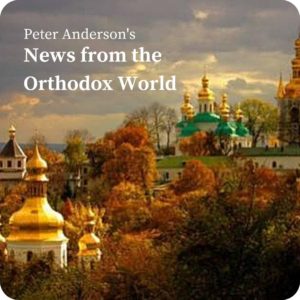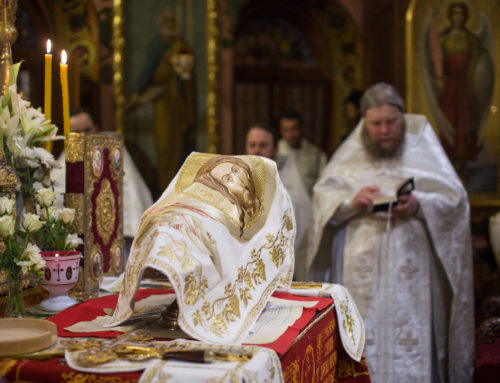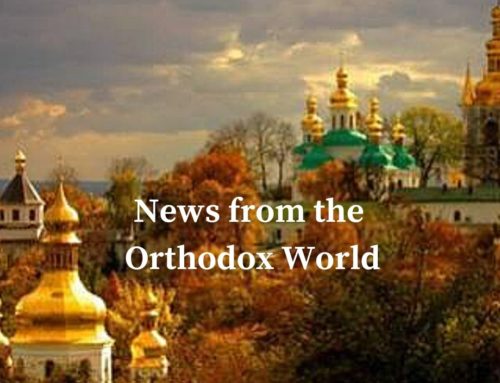Peter Anderson reports from the Orthodox world.
Longstanding reporter of the news from the Eastern Church, Peter Anderson shares our dream of a unified Christianity. His love for Orthodoxy has driven him to this personal mission to share the news of East with the world through his email list. The Urbi et Orbi Foundation is proud to share his efforts and his insights with you.

The website of the Serbian Patriarchate has just posted a major interview of Patriarch Porfirije with the Serbian daily newspaper Večernje Novosti. www.spc.rs/sr/patrijarh_porfirije_intervju_dat_vechernjim_novostima Yesterday, my report covered the major interview given by Bishop Irinej of Bačka (Serbian Patriarchate) given to Serbian newspaper Politika. https://www.spc.rs/sr/episkop_bachki_irinej_intervju_dat_politici Although Patriarch Porfirije considers Bishop Irinej to be his “spiritual father,” a comparison of the two interviews is further evidence that the two men have very different styles and tones. Having read various statements by Bishop Irinej over the years, it have become apparent to me that if his disagrees with the position taken by another, he is not reluctant to respond with an “attack” using strong language. On the other hand, Porfirije’s approach is “do everything to blunt all possible blades among the people.” In fact, Porfirije’s approach in this regard is the subject of the first question and answer in the interview. The Google translation tool works quite well on the interview of Patriarch Porfirije, and it is worthwhile to read the entire interview. I have pasted certain excerpts from the interview below. It is also noteworthy that Patriarch Porfirije states that the annual assembly of all the bishops of the Serbian Patriarchate is expected to occur later this month.
The dulling of blades:
“Dulling blades is the duty of all people. We are all called to work on the realization of the ideal of living together, which the Holy Prophet Isaiah vividly described as beating the swords into plowshares, turning the weapons of death into tools of life. Such redemption of time, which is a gift as the apostle Paul called it, to God’s people, is possible only if our lives are designed with eternity and its values. I do not hesitate to engage in politics, but not in the sense of partisanship, mere struggle for power, but in the original sense of responsible care for the polis and everything that is good and beautiful in the Christian sense….
The influence and authority of the patriarch is inseparable from the whole Church because he is its first hierarch and she is the spiritual vineyard entrusted to him. The patriarchal service is the conciliar lens of everything that is good and useful for man, society, nature, the state, everything that makes up one local Church – all bishops, priests, monks and the entire people of God. It is a system of merged courts….
The dangerous world situation:
“The times we live in are irresistibly reminiscent of the Cold War era and the great crises, such as the Cuban and Korean wars, the Vietnam War and other tense situations, some of which ended in war violence. Even today, military troops, warships and planes are cruising in strategically important areas. For some, such a situation looks like the dawn of the Third World War, while others, like Pope Francis, think that it has been going on for a long time, that is, that as being guided by the interests of multinational companies, it is continuously managed around the world. This Pope’s thinking is very close to me. I would add to that America and Russia have never been at war with each other, as well as that they have jointly warned of the deepening of world crises. The two leading world powers are, basically, Christian countries, with a similar state structure. Compared to earlier times, in Russia now, thank God, it adheres much more to Christian values, nurtures the Christian ethos, and achieves close cooperation between the Church and the state. I do not share the opinion of some analysts who characterize American society as post-Christian, because I know how much faith the country has built, how many faithful there are in it, including Orthodox Christians, just as I know that their current president is an active Christian, a Roman Catholic. Because of all this, I have a deep hope that peace will prevail, and that the saying of George Santayana that only the dead “experience” the end of the war will not be relevant for long. I am aware that the great introduction of cataclysmic thinking about biological, chemical and nuclear weapons, along with the fact of large-scale migration and economic shocks, is developing a kind of civilization of fear. Fear creeps into human hearts, and there is no freedom in fear. Fear is slavery. You don’t need an outside occupier, you don’t need a war. Capture yourself. Such a civilization of fear is opposed by the risen Christ, who, as represented on the baroque icons with which I grew up, raises the banner of final victory over fear and death, a sign of eternal joy. From that experience of the resurrection of Christ came the words of the Apostle Paul, which summarize in the best way what has been said above: “Rejoice always in the Lord, and again I say, rejoice!”
Possible comprehensive agreement relating to Kosovo:
“… I also know that responsible politicians, under great pressure and in difficult circumstances, talk to many parties looking for a solution that is best possible for our people. Personally, I do not know, nor do I know anyone who knows what is written in the text of the mentioned comprehensive agreement. With a great rise in temperature, uncontrollable, and big, words, unfounded suspicion, unrest and divisions among the people are encouraged, in which I do not want to participate.”
The Jasenovac death camp:
“The first Liturgies were served in the catacombs, on the graves of martyrs for the faith of Christ. We also offer a bloodless sacrifice at the tomb of Christ. And we do the same in the great martyr Jasenovac. The fact that there is an Orthodox church of God in Jasenovac, that Bishop Jovan founded a monastery on that place, is, in my opinion, the only way in which the Church nurtures the memory of the victims. By gathering in Jasenovac and other similar places, by praying, serving the Liturgy, acquiring the grace of the Holy Spirit, we transform ourselves. And a transformed and ennobled man will never blame someone’s offspring, someone’s children, for what their parents did.
An Orthodox Christian will build peace, friendship, not resentment or, God forbid, revenge. The paradox of the Christian faith is that in places like Jasenovac, by praying to Christ, the first martyr and sufferer, but also the head of salvation and life, we gain the strength to fight with all spiritual and human capacities for peace, goodness and understanding among people, to fight for everyone man. I am talking about what the Church believes in and what it does….
Possible future meeting with Pope Francis:
So far, I have met with Pope Francis three times, separately or together with other of our eminent archbishops. Each of our encounters, as well as our communication as a whole, are based on the spirit of the Gospel of Christ, in the spirit of understanding and mutual respect. In the world in which we live, for which we are both responsible, faced at the same time with the problems of the modern age, dialogue, moreover, cooperation are necessary for both sides. The fact is that Christians are directed at each other and that together we must respond to challenges that are essential to the world. After all, the apostle Paul warns us that no one can say that he does not need others.
Cardinal Stepinac:
The opening of the Vatican archives for interested researchers will certainly contribute to a better understanding of the difficult times of the Second World War in the area of the Independent State of Croatia and Stepinac’s place in them. It is possible that results that can be interpreted pro et contra may appear during the research. Of course, I am far from believing that he was directly and immediately involved in any kind of crime. However, I must say that, not only as a bishop, priest, Christian, but above all as any ordinary person, I cannot hide that, at least I have a dilemma, that I have a problem with certain of Stepinac’s actions, words, attitudes. I’m sorry if it bothers anyone. It is my obligation to be honest. At the same time, I am fully aware that the terrible circumstances in which he lived were not at all simple for him. As for the previous positions of our Church, as well as the conclusions of the Commission established for the research of this important and delicate issue, they are clear, unchanged and known to the public.
I will also say that when we talk about such topics, I always try to use words carefully.
It is said that the Orthodox world is close to the point of division after which a return to the old will be impossible. Do you think that the determination of the Serbian Church, which succinctly reads “neither Constantinople nor Moscow, but the canonical order,” will be sustainable in the conditions of intersection of the power and influence of two ancient and important patriarchates such as Moscow and Ecumenical?
But I think the belief of the existence of a point of not possible to return to a normal life of the church does not take into account the fact that the Church is not an ordinary human organization governed by different interests and is affected mainly human factors, but the one, holy, catholic and apostolic, an unearthly reality. It is crucial for the life of the Church to preserve its canonical order, the way in which the Church lives and works in the world. Having that in mind and in our hearts, our Church did not opt for any “side,” Moscow or Constantinople or any other, but remained forever faithful and determined to respect and witness to that order. Therefore, with faith in God, we will not regret the effort, as far as we can see, to restore the disturbed canonical order, and the two great and important patriarchates, Constantinople and Moscow, to restore the Eucharistic unity.
LGBT rights:
The question of marriage and the issue of same-sex unions is not a question of some “attitude” of the Church, but the expression of that very deep faith in God revealed truth about human nature and the way of its functioning, which, in the first pages of Sacred Scripture describes it: Therefore shall a man leave his father and his mother, and he shall cleave to his wife, and the two will be one flesh. I think that my commitment to the complete equality of all people in the field of personal, property and other rights is not unknown. I understand and support them. However, all these rights, legal experts explained to me, can be fully exercised in the existing legal system of the Republic of Serbia or with minimal amendments to existing laws.
Sports teams:
From the earliest childhood, I followed sports competitions with great attention, and I was a Red Star fan. However, when I became a priest, and later a Bishop, I felt that God had called me to build unity and mutual love among all people, even among the large family of those who follow sports. So I started to “cheer” for everything that is good and fair, constructive and advanced in all clubs and to call for love that implies respect for the other and the different. I am also looking forward to every sports triumph not only in our country but also in other environments. In Zagreb, for example, I shared the joy of my neighbors on the occasion of the victories of the Blues.
In my opinion, it was an impressive interview.
Peter Anderson, Seattle USA


